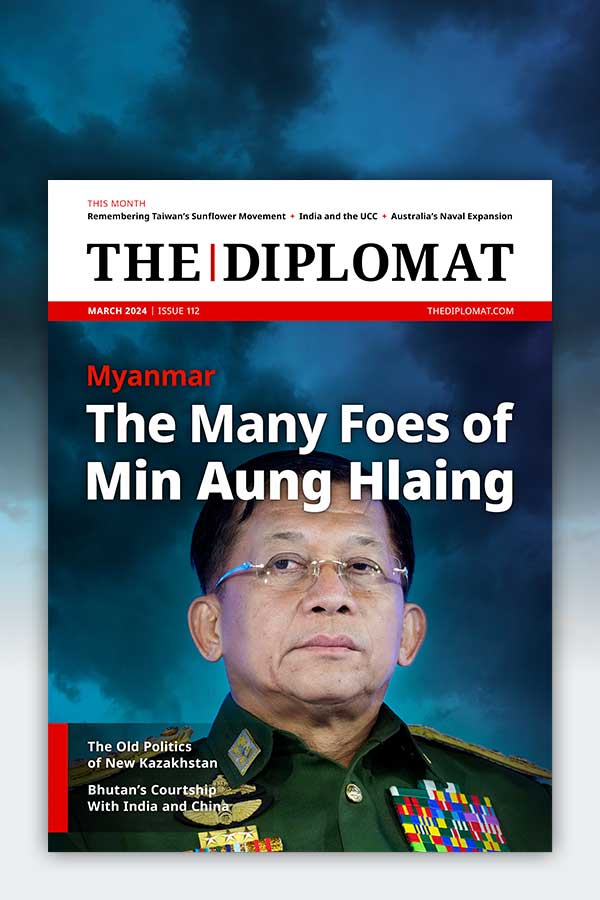| Welcome to the latest issue of Diplomat Brief. This week our top story explores the Uyghur diaspora’s efforts to locate loved ones back home. We also have an interview with Elizabeth O’Brien Ingleson, an assistant professor of International History at the London School of Economics, on how U.S. economic trends fed the transition to “Made in China.” |
| Story of the week | ![[object Object]](https://thediplomat.com/diplomat-brief/2024/vol12/images/feature.jpg?v=1) | Security The Uyghur Diaspora’s Desperate Search for Family Members in ChinaWhat Happened: Starting in 2017, an estimated one million-plus Uyghurs were forced into detention camps designed to “cure” them of “ideological viruses” and the “mental illness” of Islam. Since then, the camps have largely been emptied – but many of their previous residents were either formally convicted and sent to prison or forced into labor, under the guise of “poverty alleviation.” For Uyghurs who escaped the brutal campaign by fleeing abroad, the quest to locate their loved ones is an all-consuming, often fruitless, task. Our Focus: Uyghur diaspora members lost contact with family members still in China starting in 2017, when authorities began interning people for the “crime” of communicating with contacts overseas – even family members. Parents, children, siblings, aunts, and uncles – entire families have seemingly disappeared. One Uyghur activist who spoke with The Diplomat said she had lost contact with over 30 family members: “They cannot be found anywhere… According to [Chinese government] records my uncle, my aunt and their families ‘do not exist.’” Neither the “re-education camps” nor the forced labor have any basis in Chinese law; the extrajudicial nature of these moves means there’s no paper trail for desperate family members to track. Even formal convictions are often heavily shrouded in secrecy. It took Yalkun Uluyol over two years of scouring the rumor mill to discover that his father, who disappeared in 2018, had been sentenced to 16 years in prison. What Comes Next: Beijing’s unwillingness to provide Uyghur families with information about detained relatives has “brought misery to thousands,” said Nicola Macbean, executive director of The Rights Practice. China’s actions, she said, contravene international law, amount to “enforced disappearances,” and “should be called out by other governments.” For Uyghurs, the uncertainty is unbearable. “People tend to believe that by time passing we can forget them and things become less painful. No!” Uluyol declared. Read this story |
| Behind the News | INTERVIEW Elizabeth O’Brien InglesonElizabeth O’Brien Ingleson, an assistant professor at LSE and the author of “Made in China: When U.S.-China Interests Converged to Transform Global Trade,” on the interplay of economic dynamics during China-U.S. normalization: “Chinese leaders’ ability to lift their population out of poverty came at the expense of non-unionized minimum-wage textile workers in the United States and later other industries as well. But that impact on U.S. workers was fundamentally enabled by the decisions of industry leaders and executives at U.S. corporations, aided by legislation in Washington.” Read the interview |
| This Week in Asia | Northeast Asia Taiwan Marks Sunflower Movement’s 10th AnniversaryOn March 18, 2014, thousands of Taiwanese protesters – many of them students – occupied the legislature to protest the rushed passage of the Cross-Strait Services in Trade Agreement (CSSTA). It was the start of the Sunflower Movement, the biggest social mobilization in Taiwan since democratization. On March 18, 2024, participants revisited the movement through commemorative events, with an eye toward the current milieu in Taiwan’s politics. Find out more | South Asia Pakistan Strikes Alleged TTP Hideouts in AfghanistanAfghanistan-Pakistan relations reached a new low on March 18, with Pakistan’s military conducting airstrikes on suspected hideouts for the Pakistani Taliban (TTP) across the border in Afghanistan. Islamabad has grown increasingly frustrated with the Taliban government in Kabul’s unwillingness to crack down on its ideological cousin, the TTP, amid a surge of terrorist attacks by the group within Pakistan. The decision to pursue a military solution could upend nascent efforts to repair Afghanistan-Pakistan ties. Find out more | Southeast Asia Vietnamese Parliament to Meet After President's ResignationVietnam’s National Assembly is reportedly meeting this week to discuss unspecified “personnel issues” amid further high-level upheaval at the upper ranks of the government. The report came after the Dutch King and Queen postponed a visit to Vietnam at Hanoi’s request, just five days before it was scheduled to begin. This led some Vietnam watchers to speculate about the pending resignation of President Vo Van Thuong, who was scheduled to host the royal couple. Sure enough, Thuong resigned on Wednesday over unspecified “violations.” Thuong, 53, a close ally of Communist Party of Vietnam chief Nguyen Phu Trong, was announced as president in March of last year, after a corruption scandal drove his predecessor from office. Find out more | Central Asia Tajik Opposition Activists Still Missing in TurkeyOn February 23, Nasimjon Sharifov – a Tajik opposition activist affiliated with Group 24 – went missing in Istanbul. Two weeks later, Sohrab Zafar, the leader of Group 24, also went missing. Turkish authorities have not commented on the whereabouts of the two men, but other Tajik activists are certain they’ve either been arrested by Turkish authorities or kidnapped by Tajik operatives. There’s ample reason to worry given Tajikistan’s history of carrying out forced disappearances and engagement in transnational repression, and the murder of Group 24's founder in Istanbul in 2015. Find out more |
| Visualizing APAC |  | Source: Korea Trade Statistics Promotion Institute South Korea never imposed official tariffs on the Russian energy sector. Nevertheless, Korean imports of Russian fossil fuels have plummeted since Russia’s invasion of Ukraine. See the full picture |
| Word of the Week | Society 主旋律Zhǔxuánlǜ: Mandarin for “main theme,” it often refers to the central message in a CCP propaganda product. Find out more |
|  |

![[object Object]](https://thediplomat.com/diplomat-brief/2024/vol12/images/feature.jpg?v=1)

